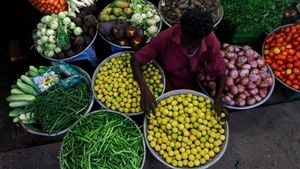Israel's conflict with Hezbollah has ramped up significantly as military operations spill over from Gaza and become entrenched along the Lebanese border. Recent actions by Israel highlight its strategic imperative to neutralize Hezbollah’s capabilities, which have grown increasingly assertive since Hamas launched its surprise offensive on October 7, 2023. On November 14, Israel's Defense Minister announced the escalation of ground operations targeting Hezbollah strongholds, particularly around Dahiyeh, a district known for its dense civilian population.
This latest round of violence marks another chapter in the long-standing hostilities between the two parties. Israel's military campaign has included nearly 20 airstrikes targeting Hezbollah infrastructure, resulting in significant structural damage and civilian casualties, including children. Reports indicate more than 3,400 fatalities have occurred within Lebanon since the onset of these clashes, with the situation deteriorated sharply post-September.
Meanwhile, the World Bank released alarming figures underscoring the economic toll of this extended conflict. The organization estimates Lebanon has incurred over $5 billion in economic losses due to the war, with infrastructure damages estimated at $3.4 billion, predominantly affecting commerce, tourism, and agriculture. The devastation is particularly acute around the southern regions near the Israel-Lebanon border, where approximately 99,209 housing units have been assessed as either damaged or destroyed, leading to mass displacements of civilians. This multi-billion dollar economic loss compounds Lebanon's pre-existing financial crisis, characterized by soaring poverty rates and systemic corruption.
Human interest perspectives also abound amid the conflict, particularly concerning the impact on children and families caught in the crossfire. UNICEF has expressed growing concern over the worsening humanitarian situation, asserting the urgent need for immediate cessation of hostilities to protect vulnerable populations.
The Israeli military's expanded operational footprint is not limited to southern Lebanon but also includes increased airstrikes on Syria, targeting areas identified as Hezbollah bastions. Reports suggest these strikes resulted in 20 fatalities, including militants and Iran-backed fighters. Notably, areas such as the Mazzeh neighborhood in Damascus, previously known for housing embassies, have become routine targets due to their connections to Iranian military infrastructure.
Ali Larijani, a senior Iranian official and advisor to Supreme Leader Ali Khamenei, recently met with Lebanese leaders, underlining Iran's unwavering support for Hezbollah and the broader military objectives against Israel. His discussions coincided with U.S. efforts aimed at negotiating cease-fires between conflicting parties, with recent reports indicating the U.S. has proposed new frameworks for de-escalation to parliamentary leaders such as Nabih Berri.
Despite these international efforts, both sides have shown little inclination to back down. Hezbollah continues to launch missile strikes and drone attacks on Israeli territories, marking its steadfast commitment to retaliate for perceived aggressions. The Israeli Defense Forces (IDF) have vowed to respond decisively to these provocations.
At the forefront of this complex narrative is Lebanon, struggling with the repercussions of warfare on both its populace and its already crippled economy. The unrest has also reignited discussions around the deployment of Lebanese armed forces to maintain stability and curb Hezbollah's military influence, something the United Nations suggests is pivotal to reaching any durable settlements.
For many, the enduring conflict reflects deep-seated regional tensions, wherein multifaceted alliances dictate military engagements and broaden the conflict's scope. Iran's backing of both Hezbollah and Hamas creates layers of strategic complexity, with numerous stakeholders vying for influence over the Levant region.
This continuous military engagement and its associated humanitarian crises raise urgent questions about the future of Lebanon and its people, who find themselves trapped between powerful militant factions and increasingly aggressive military operations. The world watches closely, hoping for meaningful dialogue and paths to peace but facing the harsh realities of entrenched hostilities.
Overall, the military escalation between Israel and Hezbollah, alongside the backdrop of economic strife and humanitarian concerns, frames a grim reality for the people of Lebanon and heightens fears of broader regional conflict. The international community's calls for restraint and diplomacy are more pressing than ever, as the war continues to claim countless lives and plunge Lebanon even farther down the road of economic despair.



